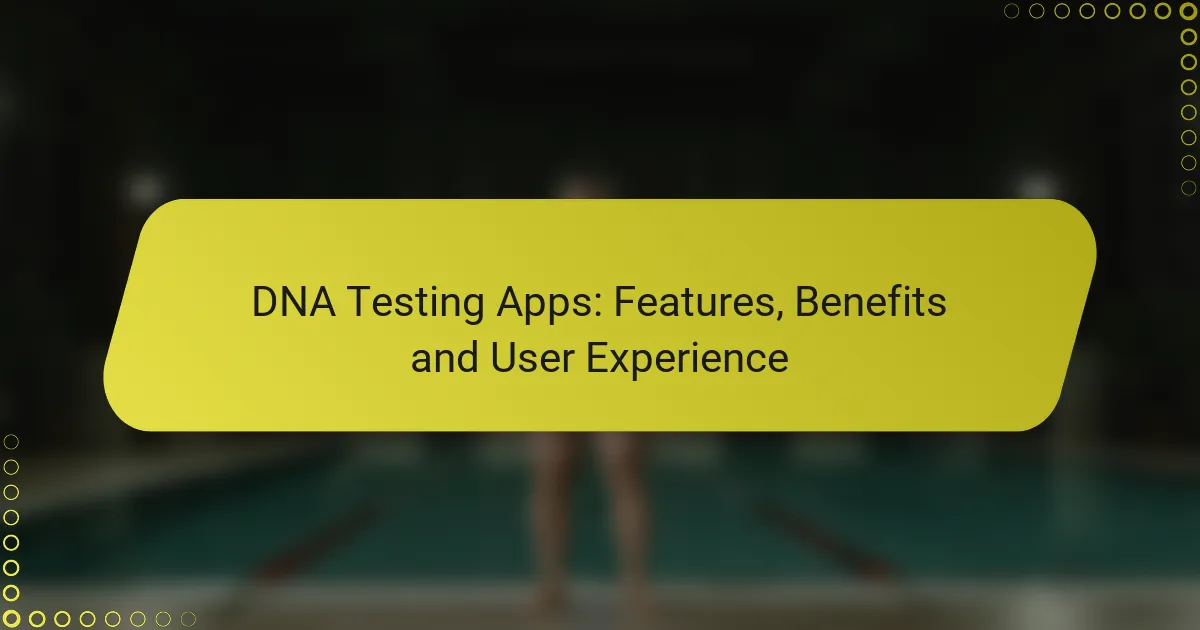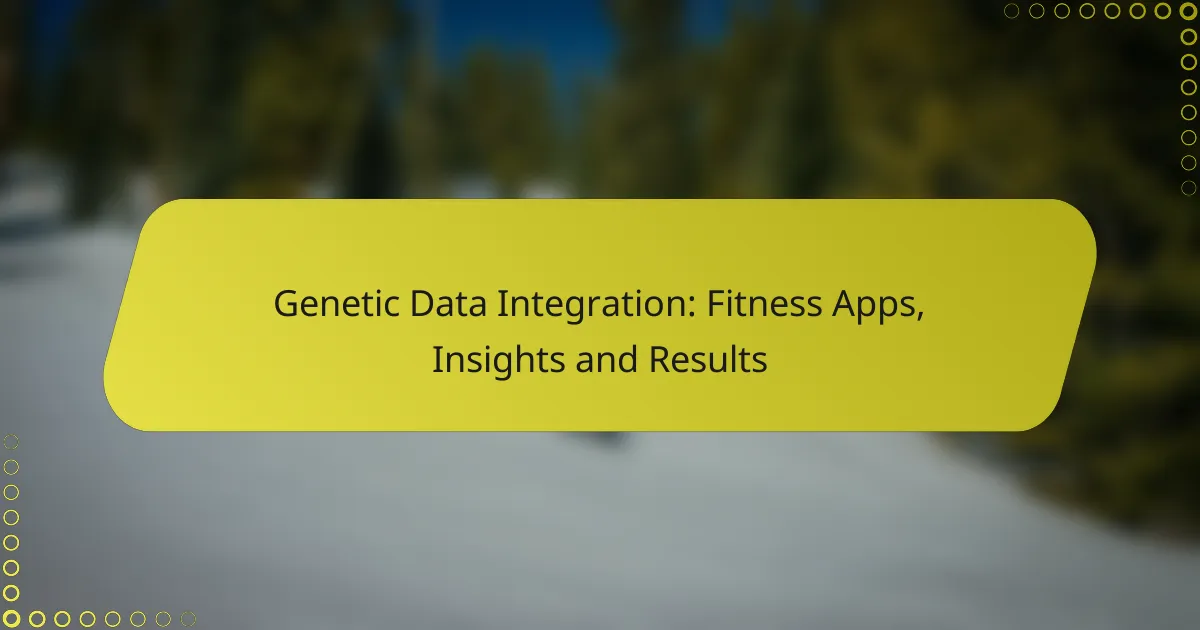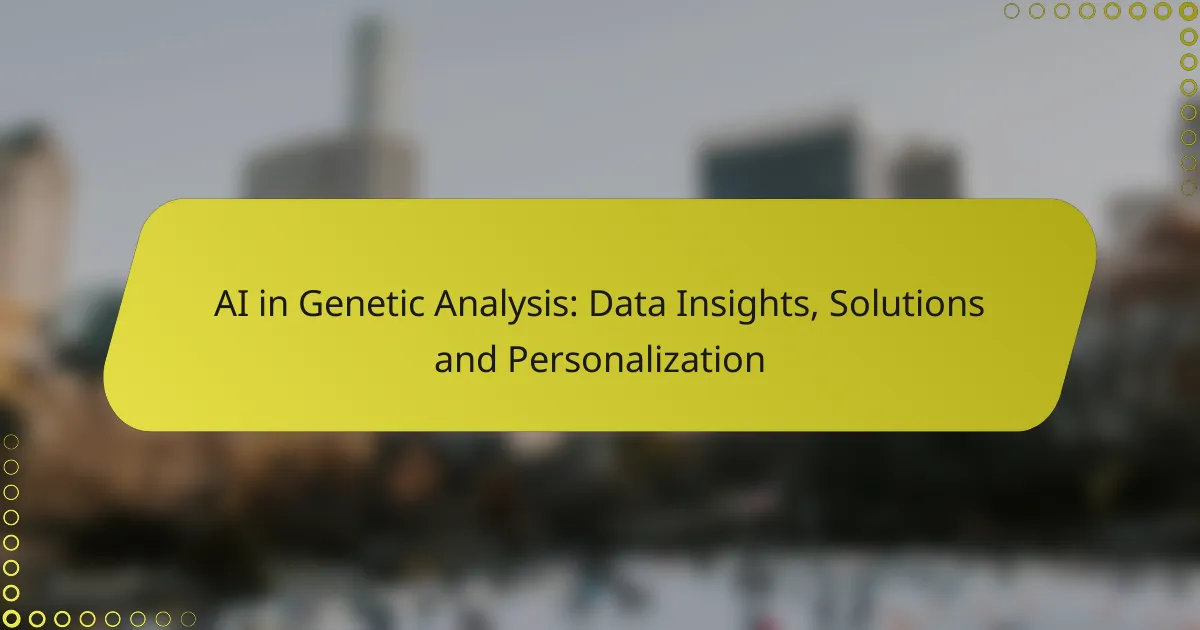DNA testing apps have revolutionized the way individuals explore their ancestry and health, offering insights into genetic traits and potential health risks. With options like 23andMe and AncestryDNA, users can access detailed reports and personalized recommendations tailored to their unique genetic profiles. When choosing an app, it’s essential to consider features such as data privacy, user-friendliness, and customer support to enhance the overall experience.
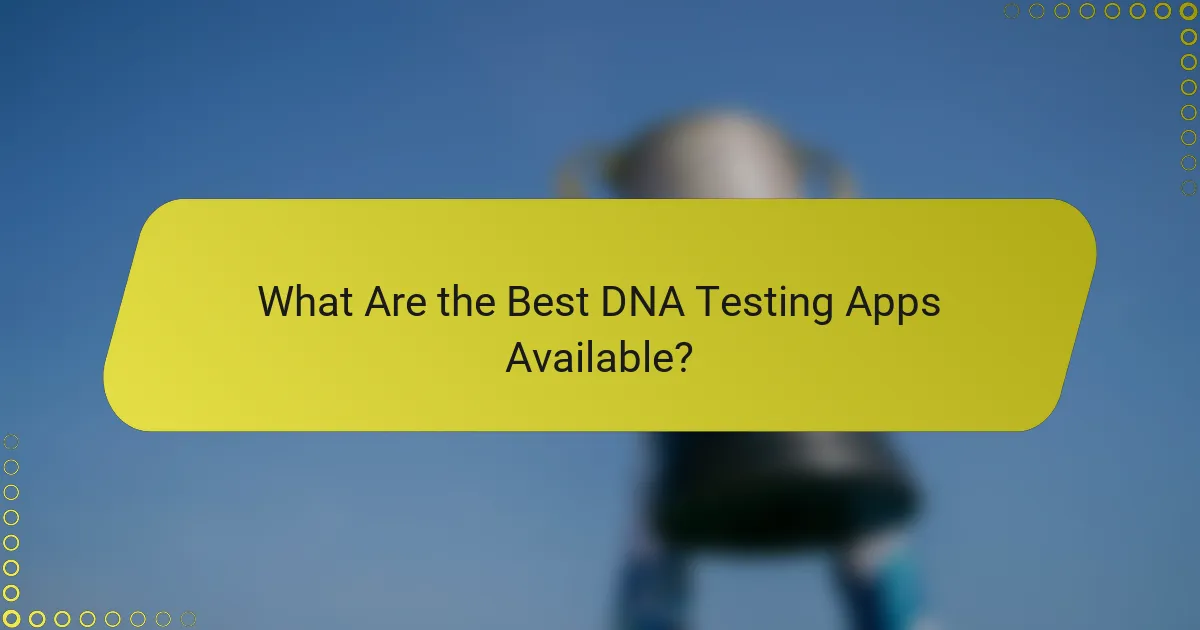
What Are the Best DNA Testing Apps Available?
The best DNA testing apps provide users with insights into their ancestry, health, and genetic traits. Popular options include 23andMe, AncestryDNA, MyHeritage, Living DNA, and FamilyTreeDNA, each offering unique features and benefits tailored to different user needs.
23andMe
23andMe is well-known for its comprehensive health and ancestry reports. Users receive information about genetic traits, potential health risks, and carrier status for certain conditions, alongside ancestry composition and DNA relatives.
The app is user-friendly, allowing individuals to easily navigate through their results. A notable feature is the ability to connect with DNA relatives, which can help users build their family trees.
AncestryDNA
AncestryDNA focuses primarily on ancestry and genealogy, providing users with detailed ethnicity estimates and connections to potential relatives. The app integrates seamlessly with Ancestry’s extensive family tree database, making it easier to explore family history.
Users can expect to receive a breakdown of their ethnic origins and the ability to connect with others who share similar DNA. This app is particularly beneficial for those interested in genealogy and historical family connections.
MyHeritage
MyHeritage offers a balanced approach to ancestry and health insights. Users can access ethnicity estimates, DNA matches, and health reports, which include information about genetic conditions and traits.
The app’s unique feature is its photo enhancement tools, allowing users to colorize and animate old family photos. This adds a personal touch to the genealogical experience, making it more engaging.
Living DNA
Living DNA emphasizes regional ancestry breakdowns, particularly for users with British heritage. It provides a detailed report on ancestry composition, focusing on regions within the UK and beyond.
This app is ideal for those wanting to explore their ancestry in depth, as it offers a unique perspective on genetic heritage. Users can also access family health reports, although these are less comprehensive than some competitors.
FamilyTreeDNA
FamilyTreeDNA is known for its extensive testing options, including Y-DNA and mtDNA tests, which are useful for tracing paternal and maternal lines. This app is particularly favored by serious genealogists and those looking to delve deeper into their ancestry.
Users can compare their results with a large database of other users, facilitating connections with distant relatives. The app also provides tools for building family trees and exploring genetic matches.
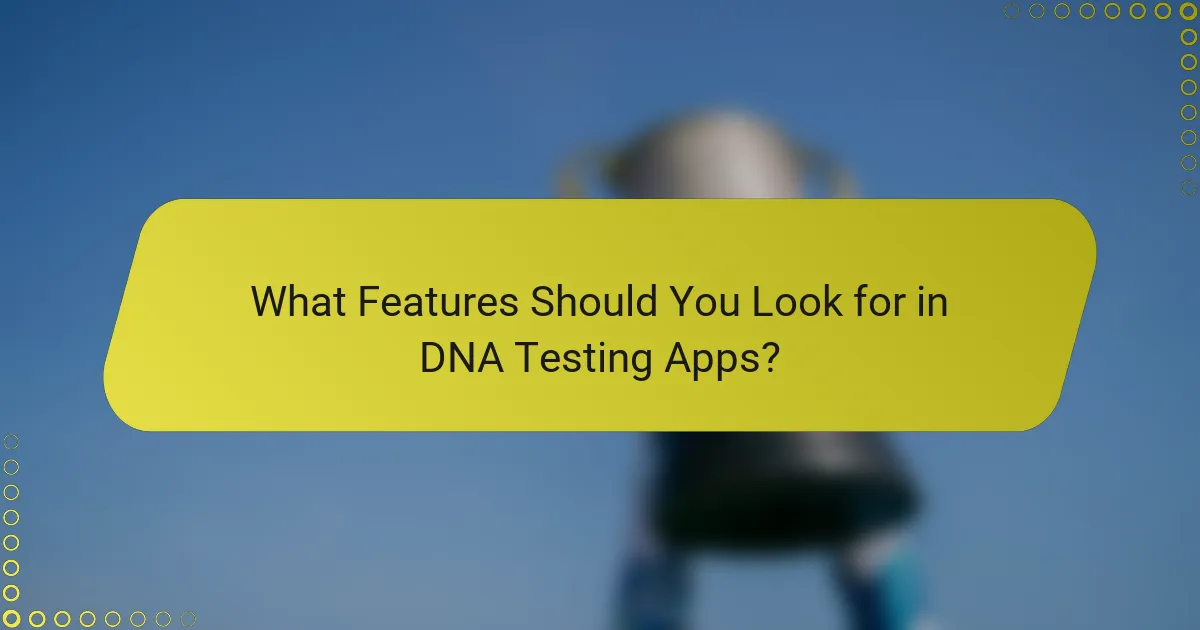
What Features Should You Look for in DNA Testing Apps?
When selecting a DNA testing app, prioritize features that ensure data privacy, ease of use, detailed reporting, and reliable customer support. These elements significantly enhance the user experience and the overall value of the service.
Data Privacy and Security
Data privacy and security are critical when using DNA testing apps, as they handle sensitive genetic information. Look for apps that comply with regulations like GDPR in Europe or HIPAA in the United States, ensuring your data is protected.
Check if the app uses encryption for data storage and transmission. Strong privacy policies should clearly outline how your data is used and whether it is shared with third parties.
User-Friendly Interface
A user-friendly interface is essential for a smooth experience with DNA testing apps. The app should be intuitive, allowing users to navigate easily through the testing process and understand their results without confusion.
Consider apps that offer guided tutorials or FAQs to assist new users. A clean design with clear labels and minimal clutter can significantly enhance usability.
Comprehensive Reports
Comprehensive reports provide valuable insights into your genetic information. Look for apps that offer detailed analysis, including ancestry, health risks, and traits, presented in an easy-to-understand format.
Some apps may include visual aids like charts or graphs to help interpret the data. Ensure the reports are regularly updated to reflect new research findings and insights.
Customer Support
Reliable customer support is vital for addressing any issues or questions that may arise during your experience with a DNA testing app. Check if the app offers multiple support channels, such as email, chat, or phone support.
Look for apps that provide prompt responses and have a comprehensive knowledge base or community forum. Good customer support can enhance your overall satisfaction and help you make the most of your DNA testing experience.
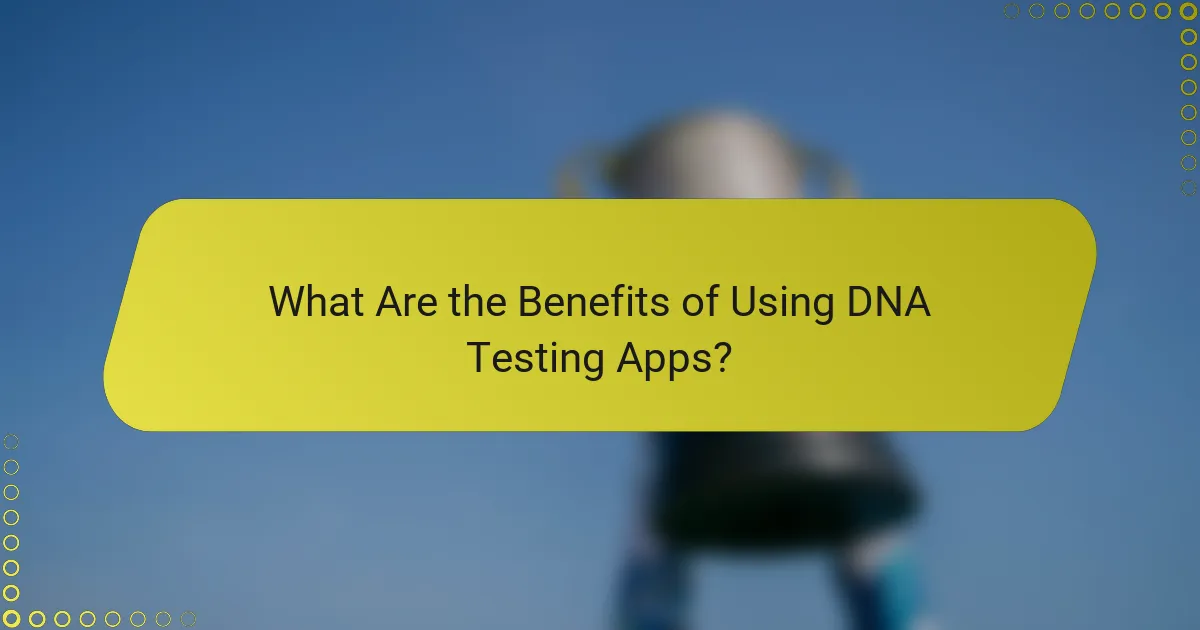
What Are the Benefits of Using DNA Testing Apps?
DNA testing apps offer numerous benefits, including health insights, ancestral tracking, genetic risk assessments, and personalized recommendations. These applications provide users with valuable information about their genetic makeup, which can inform health decisions and enhance personal knowledge.
Health Insights
Health insights from DNA testing apps can reveal predispositions to certain health conditions and traits. By analyzing genetic markers, users can gain a better understanding of their potential health risks and take proactive measures to mitigate them.
For example, some apps may indicate a higher likelihood of developing conditions like diabetes or heart disease. This information can guide users in making lifestyle changes or seeking medical advice tailored to their genetic profile.
Ancestral Tracking
Ancestral tracking allows users to explore their family heritage and genetic lineage. Many DNA testing apps provide detailed reports on ethnic backgrounds and geographical origins, helping individuals connect with their ancestry.
Users can often visualize their ancestry through interactive family trees or maps, which can deepen their understanding of cultural heritage and family history. This feature is particularly appealing to those interested in genealogy or cultural exploration.
Genetic Risk Assessment
Genetic risk assessment evaluates an individual’s likelihood of developing specific diseases based on their DNA. These assessments can highlight genetic variants associated with various health conditions, enabling users to make informed health choices.
It’s essential to interpret these assessments carefully, as not all genetic markers guarantee disease development. Consulting with healthcare professionals can provide clarity and guidance on managing any identified risks effectively.
Personalized Recommendations
Personalized recommendations are tailored suggestions based on an individual’s genetic information. These may include dietary advice, exercise plans, or lifestyle modifications that align with the user’s genetic predispositions.
For instance, a user with a genetic predisposition to lactose intolerance may receive recommendations for lactose-free alternatives. Utilizing these insights can enhance overall well-being and promote healthier living tailored to one’s unique genetic profile.
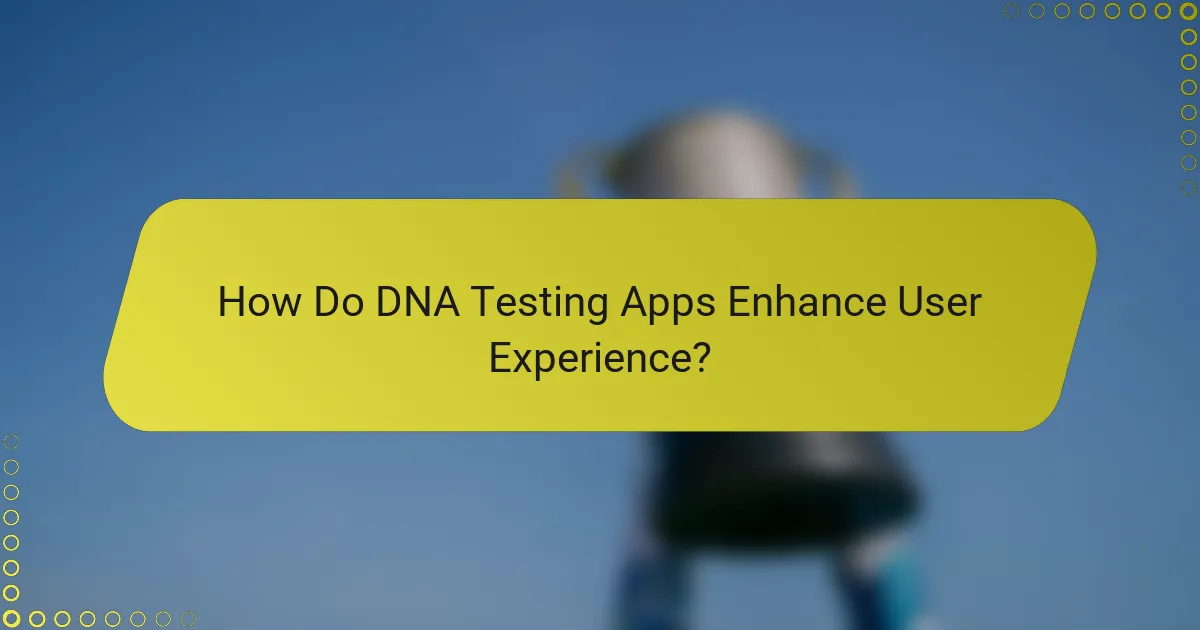
How Do DNA Testing Apps Enhance User Experience?
DNA testing apps significantly enhance user experience by providing accessible, engaging, and informative tools for understanding genetic information. These applications streamline the process of interpreting DNA results, making it easier for users to connect with their ancestry and health insights.
Interactive Features
Interactive features in DNA testing apps allow users to explore their genetic data in engaging ways. For instance, many apps offer visualizations of ancestry breakdowns, enabling users to see their ethnic origins on a map. Some apps even include gamified elements, such as quizzes or challenges related to genetic traits.
These features encourage users to delve deeper into their results and share findings with friends and family, enhancing the overall experience. Look for apps that provide customizable dashboards or interactive timelines to maximize engagement.
Community Engagement
Community engagement is a vital aspect of DNA testing apps, fostering connections among users with similar genetic backgrounds. Many applications include forums or social features where users can discuss their findings, share stories, and seek advice from others who have undergone similar testing.
Participating in these communities can provide additional insights into genetic traits and health conditions. Users should consider joining groups that focus on specific ancestry or health topics for a more tailored experience.
Easy Data Access
Easy data access is a key benefit of DNA testing apps, allowing users to retrieve and manage their genetic information conveniently. Most apps offer cloud storage, enabling users to access their results from multiple devices without hassle. Look for apps that provide straightforward navigation and clear organization of data.
Additionally, many apps allow users to download their raw DNA data, which can be useful for further analysis or sharing with healthcare providers. Ensure the app you choose complies with data privacy regulations to protect your sensitive information.
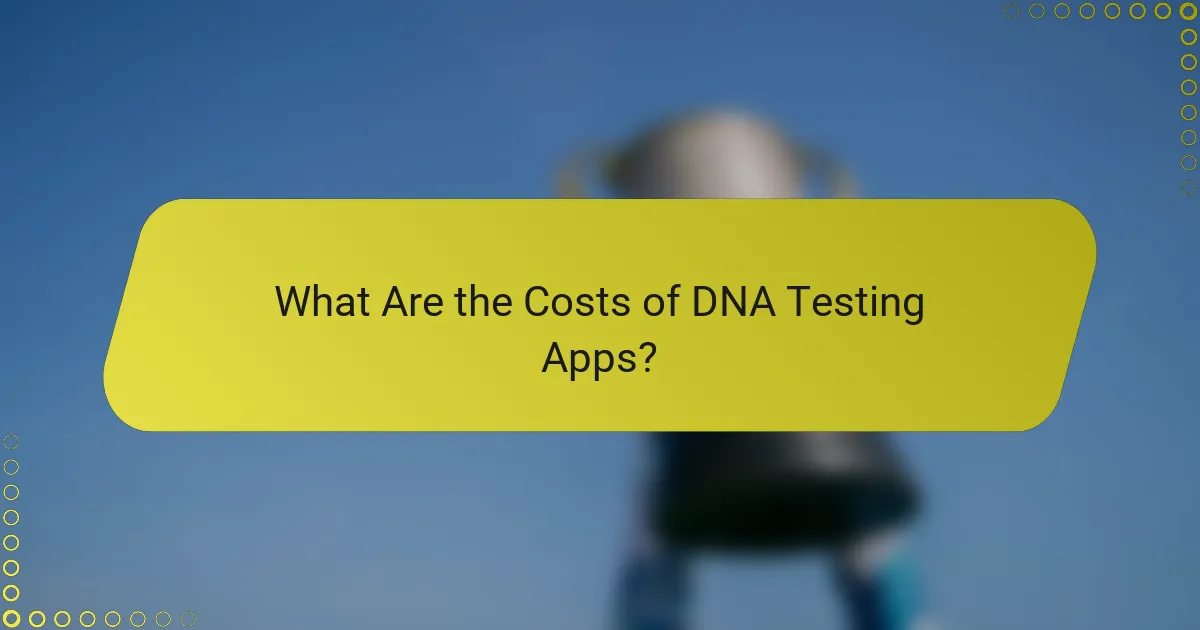
What Are the Costs of DNA Testing Apps?
The costs of DNA testing apps can vary significantly based on features, services, and subscription models. Users typically encounter one-time fees for tests and ongoing costs for additional services or premium features.
Pricing Models
DNA testing apps generally follow a few common pricing models. Many charge a one-time fee for the initial DNA test, which can range from around $50 to several hundred dollars, depending on the depth of analysis. Some apps may also offer tiered pricing based on the complexity of the tests or additional features.
In addition to one-time fees, some services incorporate a subscription model that provides ongoing access to features like health reports or ancestry updates. This can lead to monthly or annual costs that vary widely, often between $10 to $30 per month.
Subscription Options
Subscription options for DNA testing apps can enhance user experience by providing regular updates and insights. Many apps offer basic, premium, and family plans, allowing users to choose based on their needs. For instance, a basic plan might include limited reports, while a premium plan could offer comprehensive health insights and family tree building.
Annual subscriptions often come with a discount compared to monthly payments, making them a cost-effective choice for users who plan to utilize the app long-term. It’s advisable to compare the features included in each plan to ensure you select the best value.
Promotions and Discounts
Many DNA testing apps frequently run promotions or offer discounts to attract new users. Seasonal sales, referral bonuses, or introductory offers can reduce initial costs significantly, sometimes by 20% or more. It’s worth checking the app’s website or subscribing to their newsletter for the latest deals.
Additionally, some companies provide discounts for students or military personnel, which can further lower expenses. Always read the fine print to understand the terms of any promotion, including expiration dates or eligibility requirements.
